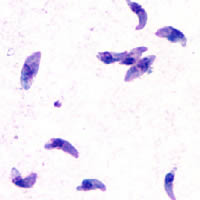
The use of Toxoplasma gondii tachyzoites produced in HeLa cells adhered to Cytodex 1 microcarriers as antigen in serological assays: an application of microcarrier technology
Sign Up to like & getrecommendations! Published in 2018 at "Cytotechnology"
DOI: 10.1007/s10616-018-0269-6
Abstract: Toxoplasma gondii can infect nearly all warm-blooded animals, including humans. In the laboratory diagnosis of toxoplasmosis, serological tests have importance in detecting antibody response. Traditionally T. gondii tachyzoites grown in vivo are being used as… read more here.
Keywords: hela cells; gondii tachyzoites; cells adhered; adhered cytodex ... See more keywords

Role of NETs in the difference in host susceptibility to Toxoplasma gondii between sheep and cattle.
Sign Up to like & getrecommendations! Published in 2017 at "Veterinary immunology and immunopathology"
DOI: 10.1016/j.vetimm.2017.05.005
Abstract: The main aim of this study was to compare extracellular traps (NETs) formation by polymorphonuclear neutrophils (PMNs) of cattle and sheep when exposed to T. gondii tachyzoites in vitro. The effects of parasite concentrations and… read more here.
Keywords: sheep cattle; gondii tachyzoites; gondii; host susceptibility ... See more keywords

Viability of Toxoplasma gondii tachyzoites in different conditions for parasite transportation
Sign Up to like & getrecommendations! Published in 2022 at "Veterinary World"
DOI: 10.14202/vetworld.2022.198-204
Abstract: Abstract Background and Aim: Toxoplasma gondii tachyzoite is the infective stage that causes acute infection, leading to severe toxoplasmosis. The tachyzoite stage has been extensively used for several inoculation purposes, including antigen production, immunological studies,… read more here.
Keywords: gondii tachyzoites; viability; toxoplasma gondii; parasite transportation ... See more keywords

Novel Activity of a Synthetic Decapeptide Against Toxoplasma gondii Tachyzoites
Sign Up to like & getrecommendations! Published in 2018 at "Frontiers in Microbiology"
DOI: 10.3389/fmicb.2018.00753
Abstract: The killer peptide KP is a synthetic decapeptide derived from the sequence of the variable region of a recombinant yeast killer toxin-like microbicidal single-chain antibody. KP proved to exert significant activities against diverse microbial and… read more here.
Keywords: gondii tachyzoites; microscopy; gondii; synthetic decapeptide ... See more keywords